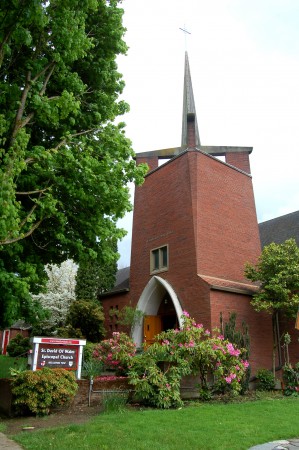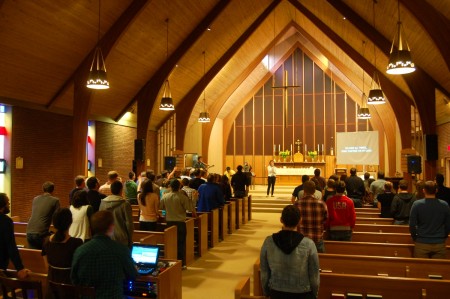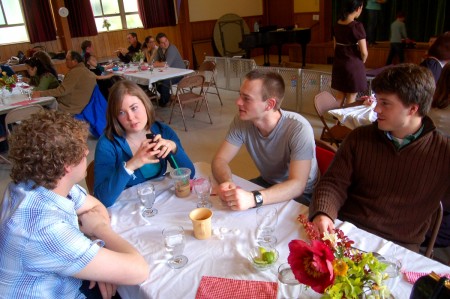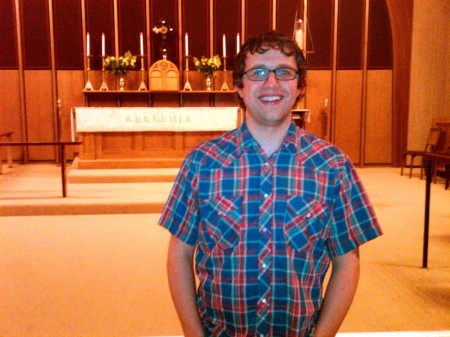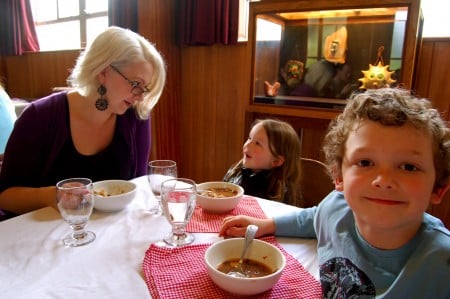By Joel Gunz
I’m a communion junkie. After leaving the Jehovah’s Witnesses, who restrict their bread and wine to only a tiny fraction of their members, I’ve made it a point to receive the sacraments from any church that allows it. The partaking of the bread and wine, symbolizing at-one-ness with the Deity is both simple and profound. I get to pretend that I’m, you know, a believer or whatever.
So far, I’ve munched and slurped with Episcopalians, Imago Deists, Reform Jews and Beaverton Foursquarers; I even returned to a Jehovah’s Witness Kingdom Hall to snack on their hardtack and Two Buck Chuck. This last Sunday evening, I took my turn at the altar of Portland’s newest indie Christian religious community, Theophilus Church.
Theophilus was formed just over a year and a half ago by Pastor A. J. Swoboda and his his wife, Quinn. They’d been chaplains at University of Oregon in Eugene when they visited Portland and had an epiphany. Strolling the funky shops and coffeehouses of Southeast Belmont street, they discovered that they were “genetically Portland,” as A. J. described it, adding, “We walked into a Stumptown coffeehouse and it felt like a family reunion.”
It wasn’t exactly a Road to Damascus moment for them, but they nevertheless felt called to pick up stakes for Portland and, before launching their church, do what so many Portlanders do best: relax. Describing their initial work as a “mission of hanging out,” the couple took some time to absorb the personality of their southeast neighborhood, soaking up its vibe. Then they started a worship service in their home. In short order, that living room church (a growing phenomenon itself) outgrew its space and they now make after-hours use of the Midcentury Modern Gothic chapel inside St. David of Wales Episcopal Church.
Although the service began at 6 p.m., we showed up an hour early to grab a bite of tortilla soup at their pre-sermon “Table Community.” Integral to Theophilus’ mission is its belief that spiritual community-building can be very effective when it takes place around mealtimes, for the breaking of bread has unique potential to engender intimacy and warmth. Plus, a lot of important Bible moments took place during the dinner hour. (See paragraph one.) (See also Eve in the Garden of Eden.)
Preaching in a plaid shirt, bluejeans and black Converse sneakers, Swoboda is intense and animated in his delivery. He loves his subject with the passion of an amateur, yet has the knowledge of a scholar. (He holds a Ph.D in Philosophy and Theology and is a professor at George Fox Evangelical Seminary.) That said, he carefully avoids the pitfalls of preachiness or patronization–even if his service does at times resemble what we’ve seen at other Foursquare churches, of which they are a part. (The way I see it, getting filled with the Holy Spirit should happen at any time: during a pick up basketball game, a jam session, frying eggs or doing your bills. Why do Foursquare services make it seem so churchy?) In another setting, he could be talking about his favorite video game, or perhaps a new blend of coffee. At church, however, Swoboda is a Jesus geek.
The sermon that we happened to catch wrapped up a month-long summary of the Gospel of Mark. On this evening, we covered chapter nine, where Jesus, like a street entertainer, plucked a child out of his audience and worked him into the act. Saith the Gospel:
33 And he came to Caper’na-um: and being in the house he asked them, What was it that ye disputed among yourselves by the way?
34 But they held their peace: for by the way they had disputed among themselves, who should be the greatest.
35 And he sat down, and called the twelve, and saith unto them, If any man desire to be first, the same shall be last of all, and servant of all.
36 And he took a child, and set him in the midst of them: and when he had taken him in his arms, he said unto them,
37 Whosoever shall receive one of such children in my name, receiveth me; and whosoever shall receive me, receiveth not me, but him that sent me.
This episode in Jesus’ ministry and its lesson of humility is an old canard. Of course, the fact that we’d just had a free meal and didn’t even have to clear our dishes afterward, our empty bowls having been swept away by smiling Theophileans just moments earlier, lent credibility to the sermon.
Swoboda added the usual warnings about the supposedly unchildlike habits of pursuing wealth, a lucrative career or a prominent position in the world just for their own sake. Yes, yes, yes, I’ve heard all that before and, frankly, I don’t really buy it. I mean, what’s wrong with using your (God-given) talents to rock and roll in the world? What I find especially unhelpful in this thinking is that it encourages the class perception that wealthy or well-known people are, ipso facto, egocentric materialists. Such a belief is as untrue as the corresponding belief that poor people are lazy. In fact, such emphasis could even give some people an excuse to remain self righteously unambitious. I believe that humans are here to build and create and, yes, even conquer—if not other tribes, at least new challenges and horizons. Jesus didn’t have much to say about such things; as I see it, that’s a gap in his theology. There. I said it.
Still, there was much truth, I believe, in Swoboda’s observation that “kids have something profound to say about what it means to be human. They have something deep to say about being a follower of Christ…. It was as if Jesus were saying, ‘You have your ideas about greatness. I’m showing you a new form of greatness.’” That I can agree with.
He noted that large churches sometimes assign a number to each child attending Sunday school; if he becomes unruly, his number will be flashed on a wall in the auditorium, prompting his mother or father to go take care of the problem. Swoboda mused that, to Jesus’ way of thinking, each parent should be assigned a number and when we start getting too caught up in the stresses of life, our children would get a call to go remind us about what really matters. (As expecting parents, A.J. and Quinn will soon find out that that is exactly what parenting is all about—the miracle of childbearing being, not that two adults can produce a child, but that one child can produce two adults.)
Among other things, kids teach us what it means to love unconditionally. When I was unpacking my baggage from the Jehovah’s Witnesses, it was the love that I observed among non-Witnesses—not any doctrinal dispute—that convinced me that it was safe to leave a religion that I had known since my childhood and which had eventually become toxic. Jesus had that right, too: love really is all you need, and children have a better grasp on that than anyone else.
Once a month, Theophilus Church does this splendid thing: Swoboda invites children up to the altar to serve communion to the congregation. Sure, it gives kids a sense of their value and power. But the pastor’s main reason is that it does something even more important for the adults, reminding them to live in the world with childlike awe and to show unabashed, childlike generosity of spirit. They are the perfect choice to administer communion to a wandering soul like me.
And so I approached the altar and twisted off a crumb from a giant loaf held out to me by a beautiful three-year-old girl, who seemed happier to offer me the sacraments than any priest or pastor I’ve yet encountered.
As I returned to my pew, Amanda pointed up at the karaoke singalong screen, and whispered, “Typo!” in my ear:
I see your face, and
your [sic] beautiful…
I laughed, of course. And then I turned my head away so she wouldn’t see me burst into tears.
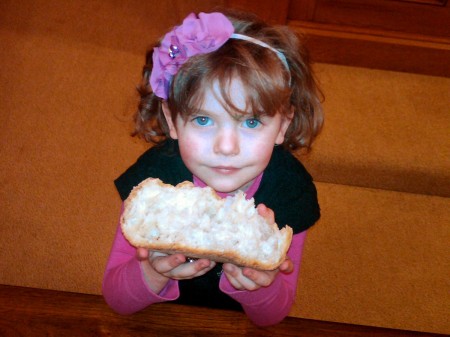
All right, share your thoughts on communion, Theophilus Church, or anything else you might have on your mind in the comments section below!
